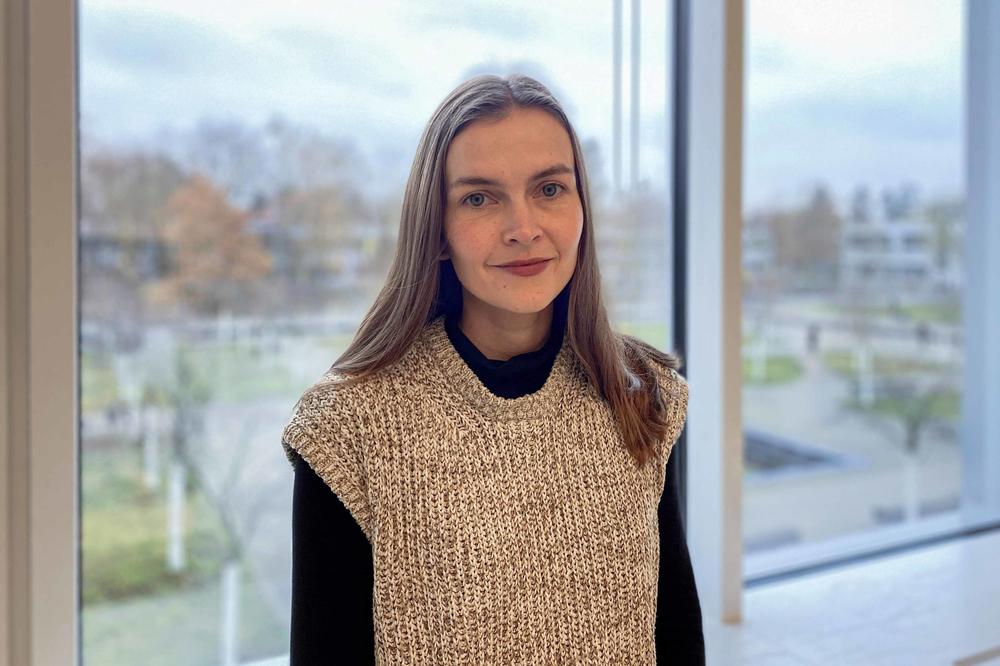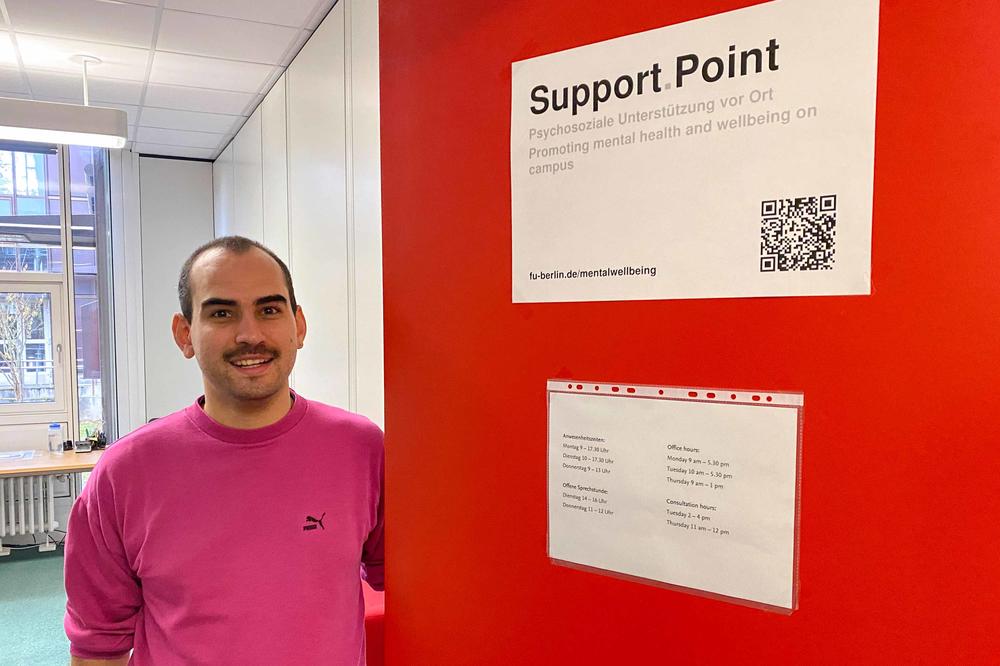“No Problem Is Too Small”
Students who are experiencing difficulties or struggling with their mental health will soon be able to access help via a total of eight support.points at Freie Universität Berlin
Dec 07, 2022
A number of surveys and studies have shown that many students found it difficult to get by under the restrictions that were in place during the Covid-19 pandemic. This has led to a significant increase in the demand for counseling and support services. This winter semester, Freie Universität Berlin is responding to this need by setting up “support.points” where students and doctoral candidates can find professional help on campus if they are going through a difficult time or struggling with their mental health. Johanna Lubig, psychologist at Freie Universität Berlin, and Stefan Petri, head of the Center for Academic Advising and Psychological Counseling, explain the background to the project in the interview below.
Psychologist Johanna Lubig runs the support.point at the Department of History and Cultural Studies in the Holzlaube building.
Image Credit: Annika MIddeldorf
Now that the first three support.points are already up and running, could you describe for us what exactly a support.point is?
Stefan Petri: “support.points” is the name we chose for our new campus-wide drop-in centers for students and doctoral candidates at Freie Universität who need help maintaining their mental health. We wanted to develop additional counseling options to complement the existing services provided by Psychological Counseling. We will be setting up eight support.points on campus in total, which means that our doors will be open to any students who need help or advice.
Who provides counseling at the support.points?
Stefan Petri is the head of the Center for Academic Advising and Psychological Counseling.
Image Credit: privat
Stefan Petri: The support.points are staffed by psychologists who have all undergone further training in either psychotherapy or coaching. They all have a strong connection to Freie Universität, either because they studied here or have worked here before. All counseling sessions are strictly confidential and can be conducted anonymously on request; our support.points are safe spaces for those who come to us.
Who is your target audience?
Johanna Lubig: Our service is primarily designed for students and doctoral candidates, but all members of Freie Universität are welcome to reach out to us. We can also provide counseling in English where necessary. Anyone who needs help or advice can simply send us an email at support.point@studienberatung.fu-berlin.de. We regularly offer online consultations, including during the period between Christmas and New Year’s Day.
Why exactly are the support.points being set up now?
Johanna Lubig: Our students are finally back on campus after two years of the Covid-19 pandemic. More than anything, we just want to be there for them. The winter semester is also the ideal time to launch this type of service because this is when most students begin their degree program. Many of them will have two years of schooling behind them that they had to complete during the pandemic, so what was already an extremely stressful time in its own right was accompanied by a whole host of other issues. And of course we also want to help people who may already be in their fourth semester but have only recently gotten the chance to study on campus or meet their instructors and peers in person for the first time because they were studying remotely via Webex until now.
You said earlier that the support.points are an additional service. Does that mean the services provided by Psychological Counseling aren’t able to keep up with demand?
Stefan Petri: We actually have pretty good take up among students at Psychological Counseling. But considering the fact that we know from the University Health Report that about thirty percent of students found the pandemic extremely stressful, the proportion of them who go to Psychological Counseling is relatively small. Maybe the sense of anonymity you feel at a large university made people feel insignificant and thus less likely to seek out help, but that’s just my guess. What we do know is that students at Freie Universität wanted more straightforward access to counseling and mental health services.
Where did you get this information?
Stefan Petri: We learned this from the students themselves – they actually came up with the idea behind the support.points. Professor Jan Lazardzig, vice dean for student affairs at the Department of Philosophy and Humanities, was the one who passed their feedback on to us. The results from the FUCSI surveys – in which students from the department asked their peers how they fared during the pandemic – also played into the concept. That was an important argument in favor of setting up the support.points. The university management recognized that additional resources were needed and made it possible.
Jonathan Bär provides counseling to students from the Department of Philosophy and Humanities.
Image Credit: Annika Middeldorf
How many support.points are there and where are they situated?
Stefan Petri: Eight support.points in total will be set up on campus, with three already up and running: at the Department of Veterinary Medicine on Koserstraße, at the Department of Philosophy and Humanities in the Rostlaube building, and at the Department of History and Cultural Studies in the Holzlaube building. These will be joined by a support.point for the Department of Biology, Chemistry, Pharmacy in January and four more in March, meaning that all drop-in centers will be available by the start of the 2023 summer semester, including their full range of workshops.
Let’s say that someone needs help but a support.point hasn’t been opened for their department yet. What should they do?
Johanna Lubig: The support.points are there to provide help to anyone who needs it. You don’t have to wait until a support.point is set up for your department to reach out.
Stefan Petri: If you don’t want others to know that you are going to counseling then you can also go to another department’s support.point. Generally speaking, the support.points are linked to specific departments, although sometimes a support.point will cover two departments, depending on their size.
Establishing a relationship and networking with the different departments is very important. By having a direct line with a department, we can quickly determine if they are experiencing any issues. At the same time, we can pass on information when we are made aware of department-specific problems by those seeking help. All this is of course anonymous and confidential.
Johanna Lubig: I run the support.point at the Department of History and Cultural Studies in the Holzlaube building. I can safely say that my open office hours are primarily attended by people from this department. After all, we also think it is important that people establish a connection with the department where they are studying. In addition to individual consultations, we also organize events, workshops, and group sessions. What we offer depends on people’s needs and wishes. As such, this can vary from subject to subject or between departments. However, when it comes to issues that are more “universal,” the psychologists at the different support.points also have the option to provide joint services.
What can students expect when they reach out to a support.point for the first time?
Johanna Lubig: They will meet psychologists who provide them with an initial consultation. This can last anywhere from ten minutes to half an hour and is aimed at defining the “problem” and maybe even beginning to brainstorm a few solutions. Where necessary, we can also provide contact to additional resources, both at Freie Universität and externally. The support.point consultations are usually shorter than those provided by Psychological Counseling, where follow-up appointments are also more standard.
What type of problems do you deal with?
Johanna Lubig: All types of problems. This is something we want to make very clear: No problem is too small to merit getting in touch with us. Nobody should be telling themselves “My problem isn’t important enough” or “Things aren’t that bad.” Even if they just want to talk about a presentation they did in class that didn’t go very well, sometimes just talking to someone about it for fifteen minutes is all you need.
Stefan Petri: The earlier a problem is addressed, the easier it is to solve. The longer you leave it, the more difficult things get.
Do other universities provide a service like this?
Stefan Petri: I’m not aware of anything like this in Germany. We do know, however, that each faculty at the University of Amsterdam has its own psychologist. And we were also in contact with the UNA Europa network. The insights we gained during a staff week at KU Leuven and the University of Helsinki were invaluable. They provide similar, easily-accessible mental health services that were a great source of inspiration for us.
Christine Boldt conducted the interview.
This interview originally appeared in German on December 12, 2022, in campus.leben, the online magazine of Freie Universität Berlin.



